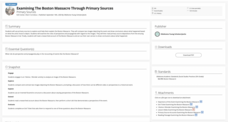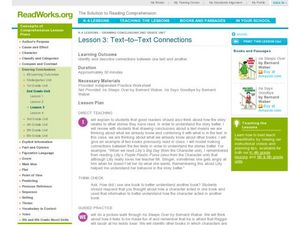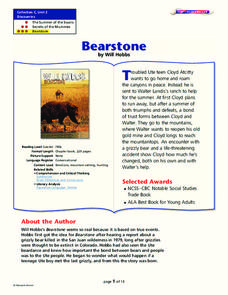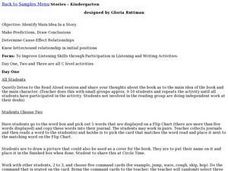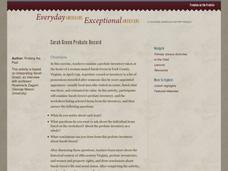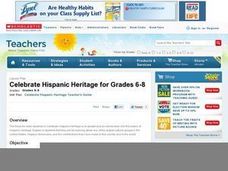Curated OER
Reading Examples
Young writers read excerpts from Gary Paulsen's memoir to identify figurative and literal language that contain sensory details. They determine which selections are examples of sensory language and fi the language is used literally or...
NOAA
Mud is Mud...or is it?
We know that the type of soil varies by location, but does the seafloor sediment also vary, or is it all the same? Scholars compare photos of the seafloor from two different locations: the Savannah Scarp and the Charleston Bump. Through...
Curated OER
The Tell-Tale Heart
Readers listen and critically read fictional prose to answer prediction questions at designated stopping points, and then they give a summary of the short story. This lesson is ideal for English language learners developing English...
EngageNY
Building Context for the Narrative: Slavery in America
Scholars use an Analyzing Images: Slavery in America handout to make predictions from pictures featuring slavery. They then discuss the pictures with partners. Learners further their thinking by close reading The Slave Trade and...
K20 LEARN
Examining The Boston Massacre Through Primary Sources
The Boston Massacre is the focus of a lesson that explores primary sources. Scholars examine two primary source images and discuss the different perspectives on the historical event. After groups read a researched account, they perform a...
Curated OER
Text Clues and Background Knowledge
Teach youngsters how to evaluate background knowledge, pictures, and context clues to draw a reasonable conclusion about a story. They practice using the discussed clues as they read the story, Alexander and the Terrible, Horrible, No...
Curated OER
Making Inferences and Drawing Conclusions
Second graders make several inferences based on the reading of Shel Silverstein poems. They write their own poetry and complete an assessment in which they differentiate between sentences that are stated or inferred.
Curated OER
Text-to-Text Connections
Help youngsters make connections between two different texts. They read two stories about the same character, Ira Sleeps Over and Ira Says Goodbye. They discuss how the character of Ira acts in each of the stories, how he is the same or...
Curated OER
Animation Pre-Production
Does your class love reading cartoons? Use their talents and interests to examine the process of writing a story they wish to tell through a cartoon. They develop the beginning, middle, and end of a story based on their original...
Curated OER
Knights of the Round Table adapted by Gwen Ross
Everyone loves the tales involving King Arthur and his knights. After reading Knights of the Round Table by Gwen Gross, learners draw inferences and conclusions, analyze story elements, and discuss figurative language, including...
Curated OER
Bearstone
Use the story "Bearstone" by Will Hobbs to explore issues related to growing up. In this work, a troubled teen finds himself through an adventure in the wilderness. Learners practice summarizing, drawing inferences and conclusions, and...
Curated OER
The Summer of the Swans
The Summer of the Swans, by Betsy Byars, is a 160-page chapter book about a family going through a difficult time. Complement your reading of Byars' book with this detailed outline of each chapter. Every section includes comprehension...
EngageNY
Drawing a Conclusion from an Experiment (part 2)
Communicating results is just as important as getting results! Learners create a poster to highlight their findings in the experiment conducted in the previous lesson in a 30-part series. The resource provides specific criteria and...
Curated OER
Identify Main Idea in a Story
Help your kindergarteners identify the main idea in a story. Small groups work with the teacher to make predictions and draw conclusions. They are able to determine cause and effect relationships. The lesson plan is divided into several...
Roy Rosenzweig Center for History and New Media
Sarah Green Probate Record
The proof is in the probate record. Much can be learned about history by investigating old, primary source documents. Class members hone their detective skills by examing the 1759 probate record of Sarah Green. Who was this lady? Was she...
Curated OER
Germs and the Importance of Washing Your Hands
Students observe what happens when bread is handled by dirty hands. They read and discuss the book "Germs." Students participate in an experiment. Students touch bread with a variation of hands: dirty, washed with soap and water, washed...
Curated OER
Chocolate Graphing
Chocolate lovers develop a bar graph based on the types of chocolate the class likes. They participate in The Art of Chocolate at The Hershey Story before they make a bar graph that shows the favorite chocolate types of their class. They...
Stanford University
Declaration of Independence
Scholars work in pairs to decide whether leaders wrote the Declaration of Independence for the rich and powerful or for every man. To draw their conclusion, pairs read excerpts from two historians and complete a graphic organizer citing...
Curated OER
Playing Historical Detective: Great Grandmother's Dress and Other Clues to the Life and Times of Annie Steel
Students draw conclusions about an mystery person based on documents and artifacts provided. In this drawing conclusions lesson, students become detectives by reading and analyzing evidence provided. This lesson includes information on...
CPALMS
Analyzing Vonnegut's View of the Future and His Commentary on the Present in Harrison Bergeron
Kurt Vonnegut's short story "Harrison Bergeron" engages adolescents with its theme about the dangers of complete societal equality. Learners complete a graphic organizer to track literary elements in the story, as well as an inference...
Curated OER
Celebrate Hispanic Heritage: Grades 6-8
To gain a better understanding of Hispanic heritage and culture, as well as to build informational comprehension skill, learners explore facets of Hispanic American History. They engage in a class discussion, research three facts, and...
Curated OER
Reading A Historical Photograph
Young scholars examine a historical photograph to gather information and draw conclusions.
Curated OER
Apply Post-Reading Skills and Discuss Persuasive Text
Learners put their reading comprehension skills to practice. In this interpreting text lesson plan, students read "Chief Red Jacket's Reply," and then respond to questions that require them to reason, infer, and analyze the selection.
Pennsylvania Department of Education
Analyzing Key Ideas and Details in Nonfiction
Learners explore nonfiction texts. In this language arts lesson plan, students read a nonfiction text and make predictions. Learners identify facts and opinions in the text and draw conclusions as they read.
Other popular searches
- Drawing Conclusions Reading
- Draw Conclusions in Reading
- Drawing Conclusions in Reading
- Draw Conclusions Reading
- "Drawing Conclusions Reading






